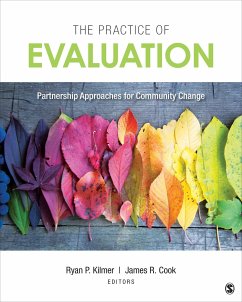The Practice of Evaluation
Partnership Approaches for Community Change
Herausgeber: Kilmer, Ryan P; Cook, James R
The Practice of Evaluation
Partnership Approaches for Community Change
Herausgeber: Kilmer, Ryan P; Cook, James R
- Broschiertes Buch
- Merkliste
- Auf die Merkliste
- Bewerten Bewerten
- Teilen
- Produkt teilen
- Produkterinnerung
- Produkterinnerung
The Practice of Evaluation: Partnership Approaches for Community Change provides foundational content on evaluation concepts, approaches, and methods, as well as applied, practical examples, with an emphasis on the use of evaluation and partnership approaches to effect change.
Andere Kunden interessierten sich auch für
![Evaluation Evaluation]() Peter H RossiEvaluation170,99 €
Peter H RossiEvaluation170,99 €![Dealing with Complexity in Development Evaluation Dealing with Complexity in Development Evaluation]() Dealing with Complexity in Development Evaluation115,99 €
Dealing with Complexity in Development Evaluation115,99 €![Regression Diagnostics Regression Diagnostics]() John FoxRegression Diagnostics51,99 €
John FoxRegression Diagnostics51,99 €![Macro Practice in Social Work for the 21st Century Macro Practice in Social Work for the 21st Century]() Steve BurghardtMacro Practice in Social Work for the 21st Century199,99 €
Steve BurghardtMacro Practice in Social Work for the 21st Century199,99 €![Understanding Terrorism Understanding Terrorism]() Gus MartinUnderstanding Terrorism181,99 €
Gus MartinUnderstanding Terrorism181,99 €![Policy Analysis for Social Workers Policy Analysis for Social Workers]() Richard K CaputoPolicy Analysis for Social Workers170,99 €
Richard K CaputoPolicy Analysis for Social Workers170,99 €![The Social Labs Revolution The Social Labs Revolution]() Zaid HassanThe Social Labs Revolution18,99 €
Zaid HassanThe Social Labs Revolution18,99 €-
-
-
The Practice of Evaluation: Partnership Approaches for Community Change provides foundational content on evaluation concepts, approaches, and methods, as well as applied, practical examples, with an emphasis on the use of evaluation and partnership approaches to effect change.
Hinweis: Dieser Artikel kann nur an eine deutsche Lieferadresse ausgeliefert werden.
Hinweis: Dieser Artikel kann nur an eine deutsche Lieferadresse ausgeliefert werden.
Produktdetails
- Produktdetails
- Verlag: Sage Publications
- Seitenzahl: 408
- Erscheinungstermin: 21. Oktober 2020
- Englisch
- Abmessung: 253mm x 201mm x 21mm
- Gewicht: 742g
- ISBN-13: 9781506368009
- ISBN-10: 150636800X
- Artikelnr.: 58477697
- Herstellerkennzeichnung
- Libri GmbH
- Europaallee 1
- 36244 Bad Hersfeld
- gpsr@libri.de
- Verlag: Sage Publications
- Seitenzahl: 408
- Erscheinungstermin: 21. Oktober 2020
- Englisch
- Abmessung: 253mm x 201mm x 21mm
- Gewicht: 742g
- ISBN-13: 9781506368009
- ISBN-10: 150636800X
- Artikelnr.: 58477697
- Herstellerkennzeichnung
- Libri GmbH
- Europaallee 1
- 36244 Bad Hersfeld
- gpsr@libri.de
P. Kilmer is Professor of Psychology and Director of the College of Liberal Arts and Sciences' Social Aspects of Health Initiative at the University of North Carolina at Charlotte, where he has been on the faculty since receiving his PhD from the University of Rochester in 1999. A community and child clinical psychologist, his work has focused on children and families and (1) using evaluation to refine programs, improve service delivery, and guide system change and local policy; and (2) understanding factors influencing the development of children at risk for emotional, behavioral, and/or academic difficulties, particularly risk and resilience and youngsters' adjustment to trauma. Dr. Kilmer has partnered with diverse community stakeholders, directing or co-directing (with Jim Cook) projects that respond to community needs, functioning on collaborative teams, and mentoring early career professionals and students. His evaluation and applied research experience includes efforts funded by the National Institute of Mental Health and the Institute of Education Sciences and extends across areas and populations, including mental health, child welfare, education, public housing, early childhood, and integrated care. Across these efforts, many of them multi-year collaborations, he has sought to improve the services and supports provided to children and families, many of whom have traditionally been marginalized or underserved.His broader professional involvements--including as President of the Global Alliance for Behavioral Health and Social Justice--demonstrate his investment in social justice and child and family well-being. At UNC Charlotte, he has been honored for his teaching, training, and community engagement with the Bonnie E. Cone Early-Career Professorship in Teaching, the Harshini V. de Silva Graduate Mentoring Award, and the Provost's Faculty Award for Community Engagement. James R. (Jim) Cook, Professor of Psychology, has been on the faculty at UNC Charlotte since 1980, after receiving his PhD from Indiana University. Consistent with his identity as a community psychologist, he has worked to foster community change that improves the lives of people who (1) are economically and socially disadvantaged; and (2) have disabilities, with special emphasis on the needs of children and families. With faculty and students, he works in partnership with community programs, to help them collect, manage, and use data to improve their ability to address peoples' needs. Dr. Cook has led government- and foundation-funded community-university partnerships that foster and sustain change efforts. He headed a HUD-funded Community Outreach Partnership Center and has co-led (with Ryan Kilmer) efforts to evaluate and support early childhood education, mental health, and neighborhood improvement programs. In addition, he led the effort to create the UNC Charlotte Institute for Social Capital, which brings together university researchers and community agencies to use data to inform and guide services. In recognition of his efforts, Dr. Cook has received awards from local nonprofit organizations. He has also been honored with the UNC Board of Governors Award for Excellence in Public Service, for demonstrating "sustained, distinguished, and superb achievement in university public service and outreach ... improving the quality of life of the citizens of North Carolina"; the inaugural UNC Charlotte Provost's Faculty Award for Community Engagement, for work that embodies "the University's commitment to civic involvement"; and the Outstanding Educator Award from the Society of Community Research and Action, in recognition of "exemplary and innovative contributions to the education of students about community psychology and community research and action."
Part I. Evaluation to Support Change: Guiding Notions and Principles
Chapter 1. Evaluative Research: Key Concepts and Applications in
Facilitating Change - James R. Cook and Ryan P. Kilmer
Chapter 2. Program Evaluation: Promises and Pitfalls - Ryan P. Kilmer and
James R. Cook
Chapter 3. Setting the Stage: A Partnership Approach to Evaluation - Ryan
P. Kilmer, James R. Cook, and Laura Marie Armstrong
Chapter 4. Cultural Sensitivity and Responsiveness in Evaluation - Cindy A.
Crusto, Diane Purvin, Steven Hoffler, Michael Awad, and Osman Özturgut
Chapter 5. Ethical Considerations - Michael Morris
Chapter 6. Evaluating Program Effectiveness: Connecting Process and
Outcomes - James R. Cook and Ryan P. Kilmer
Part II. Evaluation in Practice: Selected Strategies, Methods, and
Applications
Chapter 7. Evaluation Capacity Building: A Partnership Approach for Program
Improvement and Social Change - Yolanda Suarez-Balcazar and Tina
Taylor-Ritzler
Chapter 8. Empowerment Evaluation - Pamela S. Imm, Mary Brolin, Janice B.
Yost, and Opal R. Stone
Chapter 9. Surveying the Landscape: Using Geographic Information Systems to
Evaluate Community Programs and Facilitate Change - Greg Townley
Chapter 10. Qualitative Evaluation in Community Partnership - Andrew D.
Case and Joy S. Kaufman
Chapter 11. Network Analysis in Evaluation Research - Jennifer Watling Neal
and Zachary P. Neal
Chapter 12. Using Cost-Benefit and Cost-Effectiveness Analyses in the
Community Context - Sarah L. Pettijohn and Joanne G. Carman
Part III. Evaluation in Action: Special Topics and Contexts
Chapter 13. Investing in Nonprofit Development Through Evaluation Capacity
and Strategic Partnerships: A Four-Tiered Model - Katherine Strater Hogan,
Virginia Covill, and Ryan P. Kilmer
Chapter 14. Community-University Partnerships to Promote Change - Lindsay
G. Messinger, Ryan P. Kilmer, and James R. Cook
Chapter 15. Data-Driven Advocacy and Advocacy Evaluation - Melissa
Strompolis, Megan Branham, and Whitney Tucker
Chapter 16. Using Evaluation to Promote Improvements in Health Service
Settings - Victoria C. Scott, Jonathan P. Scaccia, and Kassy Alia Ray
Chapter 17. Creating Collaborative Partnerships Through Participatory
Evaluation to Shape Public Policy - Rebecca Campbell, Jessica Shaw, Hannah
Feeney, and Debi Cain
Chapter 18. Epilogue - Ryan P. Kilmer and James R. Cook
Chapter 1. Evaluative Research: Key Concepts and Applications in
Facilitating Change - James R. Cook and Ryan P. Kilmer
Chapter 2. Program Evaluation: Promises and Pitfalls - Ryan P. Kilmer and
James R. Cook
Chapter 3. Setting the Stage: A Partnership Approach to Evaluation - Ryan
P. Kilmer, James R. Cook, and Laura Marie Armstrong
Chapter 4. Cultural Sensitivity and Responsiveness in Evaluation - Cindy A.
Crusto, Diane Purvin, Steven Hoffler, Michael Awad, and Osman Özturgut
Chapter 5. Ethical Considerations - Michael Morris
Chapter 6. Evaluating Program Effectiveness: Connecting Process and
Outcomes - James R. Cook and Ryan P. Kilmer
Part II. Evaluation in Practice: Selected Strategies, Methods, and
Applications
Chapter 7. Evaluation Capacity Building: A Partnership Approach for Program
Improvement and Social Change - Yolanda Suarez-Balcazar and Tina
Taylor-Ritzler
Chapter 8. Empowerment Evaluation - Pamela S. Imm, Mary Brolin, Janice B.
Yost, and Opal R. Stone
Chapter 9. Surveying the Landscape: Using Geographic Information Systems to
Evaluate Community Programs and Facilitate Change - Greg Townley
Chapter 10. Qualitative Evaluation in Community Partnership - Andrew D.
Case and Joy S. Kaufman
Chapter 11. Network Analysis in Evaluation Research - Jennifer Watling Neal
and Zachary P. Neal
Chapter 12. Using Cost-Benefit and Cost-Effectiveness Analyses in the
Community Context - Sarah L. Pettijohn and Joanne G. Carman
Part III. Evaluation in Action: Special Topics and Contexts
Chapter 13. Investing in Nonprofit Development Through Evaluation Capacity
and Strategic Partnerships: A Four-Tiered Model - Katherine Strater Hogan,
Virginia Covill, and Ryan P. Kilmer
Chapter 14. Community-University Partnerships to Promote Change - Lindsay
G. Messinger, Ryan P. Kilmer, and James R. Cook
Chapter 15. Data-Driven Advocacy and Advocacy Evaluation - Melissa
Strompolis, Megan Branham, and Whitney Tucker
Chapter 16. Using Evaluation to Promote Improvements in Health Service
Settings - Victoria C. Scott, Jonathan P. Scaccia, and Kassy Alia Ray
Chapter 17. Creating Collaborative Partnerships Through Participatory
Evaluation to Shape Public Policy - Rebecca Campbell, Jessica Shaw, Hannah
Feeney, and Debi Cain
Chapter 18. Epilogue - Ryan P. Kilmer and James R. Cook
Part I. Evaluation to Support Change: Guiding Notions and Principles
Chapter 1. Evaluative Research: Key Concepts and Applications in
Facilitating Change - James R. Cook and Ryan P. Kilmer
Chapter 2. Program Evaluation: Promises and Pitfalls - Ryan P. Kilmer and
James R. Cook
Chapter 3. Setting the Stage: A Partnership Approach to Evaluation - Ryan
P. Kilmer, James R. Cook, and Laura Marie Armstrong
Chapter 4. Cultural Sensitivity and Responsiveness in Evaluation - Cindy A.
Crusto, Diane Purvin, Steven Hoffler, Michael Awad, and Osman Özturgut
Chapter 5. Ethical Considerations - Michael Morris
Chapter 6. Evaluating Program Effectiveness: Connecting Process and
Outcomes - James R. Cook and Ryan P. Kilmer
Part II. Evaluation in Practice: Selected Strategies, Methods, and
Applications
Chapter 7. Evaluation Capacity Building: A Partnership Approach for Program
Improvement and Social Change - Yolanda Suarez-Balcazar and Tina
Taylor-Ritzler
Chapter 8. Empowerment Evaluation - Pamela S. Imm, Mary Brolin, Janice B.
Yost, and Opal R. Stone
Chapter 9. Surveying the Landscape: Using Geographic Information Systems to
Evaluate Community Programs and Facilitate Change - Greg Townley
Chapter 10. Qualitative Evaluation in Community Partnership - Andrew D.
Case and Joy S. Kaufman
Chapter 11. Network Analysis in Evaluation Research - Jennifer Watling Neal
and Zachary P. Neal
Chapter 12. Using Cost-Benefit and Cost-Effectiveness Analyses in the
Community Context - Sarah L. Pettijohn and Joanne G. Carman
Part III. Evaluation in Action: Special Topics and Contexts
Chapter 13. Investing in Nonprofit Development Through Evaluation Capacity
and Strategic Partnerships: A Four-Tiered Model - Katherine Strater Hogan,
Virginia Covill, and Ryan P. Kilmer
Chapter 14. Community-University Partnerships to Promote Change - Lindsay
G. Messinger, Ryan P. Kilmer, and James R. Cook
Chapter 15. Data-Driven Advocacy and Advocacy Evaluation - Melissa
Strompolis, Megan Branham, and Whitney Tucker
Chapter 16. Using Evaluation to Promote Improvements in Health Service
Settings - Victoria C. Scott, Jonathan P. Scaccia, and Kassy Alia Ray
Chapter 17. Creating Collaborative Partnerships Through Participatory
Evaluation to Shape Public Policy - Rebecca Campbell, Jessica Shaw, Hannah
Feeney, and Debi Cain
Chapter 18. Epilogue - Ryan P. Kilmer and James R. Cook
Chapter 1. Evaluative Research: Key Concepts and Applications in
Facilitating Change - James R. Cook and Ryan P. Kilmer
Chapter 2. Program Evaluation: Promises and Pitfalls - Ryan P. Kilmer and
James R. Cook
Chapter 3. Setting the Stage: A Partnership Approach to Evaluation - Ryan
P. Kilmer, James R. Cook, and Laura Marie Armstrong
Chapter 4. Cultural Sensitivity and Responsiveness in Evaluation - Cindy A.
Crusto, Diane Purvin, Steven Hoffler, Michael Awad, and Osman Özturgut
Chapter 5. Ethical Considerations - Michael Morris
Chapter 6. Evaluating Program Effectiveness: Connecting Process and
Outcomes - James R. Cook and Ryan P. Kilmer
Part II. Evaluation in Practice: Selected Strategies, Methods, and
Applications
Chapter 7. Evaluation Capacity Building: A Partnership Approach for Program
Improvement and Social Change - Yolanda Suarez-Balcazar and Tina
Taylor-Ritzler
Chapter 8. Empowerment Evaluation - Pamela S. Imm, Mary Brolin, Janice B.
Yost, and Opal R. Stone
Chapter 9. Surveying the Landscape: Using Geographic Information Systems to
Evaluate Community Programs and Facilitate Change - Greg Townley
Chapter 10. Qualitative Evaluation in Community Partnership - Andrew D.
Case and Joy S. Kaufman
Chapter 11. Network Analysis in Evaluation Research - Jennifer Watling Neal
and Zachary P. Neal
Chapter 12. Using Cost-Benefit and Cost-Effectiveness Analyses in the
Community Context - Sarah L. Pettijohn and Joanne G. Carman
Part III. Evaluation in Action: Special Topics and Contexts
Chapter 13. Investing in Nonprofit Development Through Evaluation Capacity
and Strategic Partnerships: A Four-Tiered Model - Katherine Strater Hogan,
Virginia Covill, and Ryan P. Kilmer
Chapter 14. Community-University Partnerships to Promote Change - Lindsay
G. Messinger, Ryan P. Kilmer, and James R. Cook
Chapter 15. Data-Driven Advocacy and Advocacy Evaluation - Melissa
Strompolis, Megan Branham, and Whitney Tucker
Chapter 16. Using Evaluation to Promote Improvements in Health Service
Settings - Victoria C. Scott, Jonathan P. Scaccia, and Kassy Alia Ray
Chapter 17. Creating Collaborative Partnerships Through Participatory
Evaluation to Shape Public Policy - Rebecca Campbell, Jessica Shaw, Hannah
Feeney, and Debi Cain
Chapter 18. Epilogue - Ryan P. Kilmer and James R. Cook








